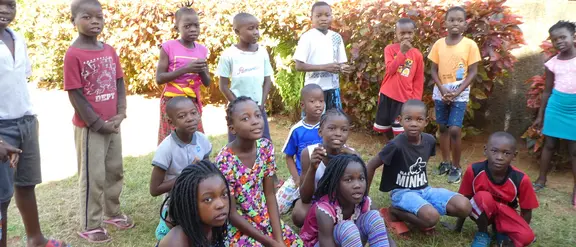Mozambique: protection against domestic violence for children
The best way to get to Luis Cabral, a neighborhood in the Mozambican capital of Maputo, is on foot: the streets are unpaved and full of potholes. When it rains, large puddles form. Barely five kilometers from the chic villas of the wealthy, the expensive restaurants, and the luxury hotels, the poor congregate here – many of them migrants from rural areas where droughts and floods make harvests meager and life difficult. If they have any work at all, it is often as a "guard." For three or four euros a day, they watch over the homes of the rich.
Luis Cabral consists mainly of small houses, huts, and garbage packed tightly together. But right in the middle is the children's and youth center of "Meninos de Mozambique" (MDM), supported by Terre des Hommes . Loud children's shouts echo from the courtyard; around 20 women sit under the awning, and an exhibition titled "Este corpo é meu!" – my body belongs to me! – hangs on the walls.
“Around a hundred children come here every day,” explains psychologist Camila Rodrigo. “Some play, and some receive tutoring to help them succeed in school and avoid dropping out. The older children discuss topics like their perceptions of men and women in various groups, and they consider how to reduce domestic violence in the neighborhood. They develop and perform plays. They write and publish reports and articles in the local media. And they serve as contact persons for the neighborhood when cases of abuse and violence are observed or suspected.”
Patriarchal ways of thinking play an important role
Camila and her ten colleagues also work with lawyers who support victims of violence. And once a week, the team checks in at the nearby police station for newly registered cases. These often involve sexual and physical violence, but also abandoned or neglected children. Alcohol and patriarchal attitudes play a significant role.
Many girls from Luis Cabral are pregnant before they turn 18. Often, the fathers disappear when they find out. Abortions are legal, but for girls from Luis Cabral, they are often too expensive and bureaucratic, as they have to explain their reasons in writing and undergo examinations. Therefore, many of them go to untrained women and risk their lives—or they give birth. Camila recounts a typical case: “We are currently caring for a 16-year-old girl who was impregnated by her 21-year-old boyfriend. After she told him, he ran away. She had twins, and no one helped her. The parents have no money. The father is physically disabled, and the mother bakes small cakes and tries to sell them. It's barely enough to live on.”
"I don't want a new man right now."
MDM will support the girl with a short training course and some start-up capital so she can open a small business and provide for her children. Twenty other girls in similar situations have already received this kind of help. We visit one of them in her small hair salon, where she is currently styling a girl's hair: "My neighbor knew that the father of my children had left me," she says. "Back then, I couldn't buy food or pay rent. My neighbor then told me that MDM supports women like me. They helped me open my small hair salon. I now live alone with my children. I don't want a new man for the time being."
Walking through the narrow streets of the neighborhood, we meet Mauricio. He's 16 years old and has been going to the MDM center since he was 14. "I'm in the media group and the theater group," he says proudly. "We've already done several plays, and most of them are about violence. There's a lot of violence here in Luis Cabral. But I think it's decreased since we've been active here. We perform our plays and raise awareness. We want people to understand: This isn't right! Yes, a lot has changed."
